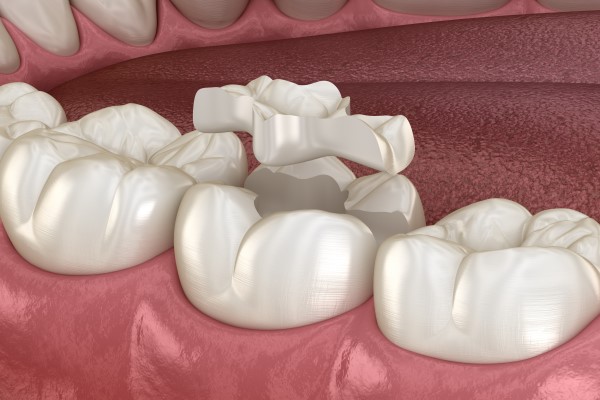How Soon Can I Eat After Getting a Dental Inlay?

A dental inlay involves a minimally invasive placement process, and most patients are able to recover fully within a few days after placement. However, it can help to avoid certain foods and drinks for a while after an inlay placement. Patients may find it challenging to eat for several hours as they adjust to the dental inlay.
Eating after a dental inlay: Here is what you need to know
There are not always specific instructions provided on how long to wait to eat after receiving a dental inlay. However, there are suggestions that dentists often provide to help ensure that there are no complications with the dental inlay and to help the patient avoid any increased irritation.
When can I eat after getting a dental inlay?
Some patients report being able to eat within an hour after receiving a dental inlay. However, some dentists recommend waiting a few hours to get used to the feel of the dental inlay and to reduce the risk of any sensitivity. There are also certain foods and drinks that should not be consumed for the first 24 hours after receiving a dental inlay.
What foods are good to eat after getting a dental inlay?
It is best to stick to foods that are soft and easy to chew for the first 24 hours and to avoid foods that are hot or cold. It is also encouraged to only drink water for the first 24 hours because dark beverages (coffee, tea, and soft drinks) may cause irritation to the gums and tooth that received the inlay.
Are there foods and drinks to avoid?
Foods that are sticky, chewy, or tough could pull on the dental inlay before the cement has the opportunity to properly bond. If there is any gum or tooth irritation, foods and drinks that are high in sugar should be avoided because it could increase the risk of an oral infection while the mouth is healing after the placement of the dental inlay. Hot and cold foods may also cause irritation and sensitivity within the first 24 hours.
How can I take care of my dental inlay for the long term?
The long-term and short-term focus after dental inlay placement should be on having good oral hygiene (brushing, flossing, and using mouthwash consistently each day). Regular dental visits also provide opportunities for the dentist to check on the condition of the dental inlay. They can do a dental cleaning to keep the gums, teeth, and restoration(s) clean to avoid oral health concerns.
Schedule a visit to find out if a dental inlay is right for you
If you have a damaged tooth, a dental inlay may be a way for you to restore the health, appearance, and function of your damaged tooth. If you would like to schedule a visit for our team to assess the severity of the damage and provide a treatment recommendation, call our team today. We are more than happy to answer your additional questions about dental inlays.
Are you considering a dental inlay in the New York area? Get more information at https://www.newyorkdentaloffice.com.
Check out what others are saying about our dental services on Yelp: Dental Inlay in New York, NY.
Recent Posts
A dental practice offers various services to help individuals maintain optimal oral health. Whether for routine cleanings, cosmetic enhancements, or restorative procedures, these services address different aspects of dental care. Regular visits to a dental practice ensure that individuals maintain healthy teeth and gums while addressing any concerns that may arise over time. Below are…
Dental practices work to provide strategies and guidance to individuals for maintaining strong teeth and gums. While brushing and flossing are indispensable habits, the foods and beverages individuals consume each day also influence oral health. Having a firm grasp on food, particularly how it affects oral health, can reduce the risk of tooth decay, enamel…
Cosmetic dental treatments can bring you closer to the smile of your dreams. The main focus of these services is to enhance the appearance of the smile, which in turn boosts confidence. They can even make oral hygiene and care easier, although that is not the primary purpose. Knowing when it is time to consult…
Scheduling an initial visit to a dental practice marks the first step toward maintaining optimal oral health. Proper preparation for this appointment ensures a seamless experience, allowing the dental team to provide the highest-quality care possible. Understanding what documents and information to bring facilitates efficient care, reduces stress, and helps patients feel comfortable and informed…



